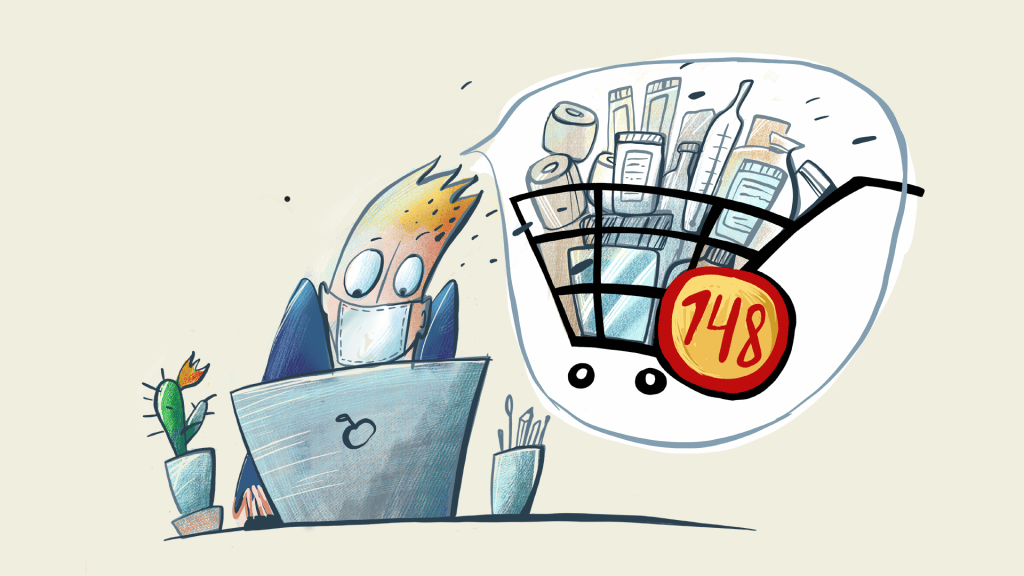
Coronavirus is grabbing international headlines as it has emerged as a growing pandemic. When health scares like this arise, they create ripple effects throughout the global economy.
Online sellers are not immune. As ecommerce has developed into a truly worldwide retail ecosystem, it is important to recognize how a health crisis of this magnitude can impact the market on both the micro and macro levels.
No matter how large or small your ecommerce business is, you can anticipate that coronavirus will affect at least some aspects in the coming months—and possibly beyond.
The key to this (or any other health-related economic concerns) is to be prepared and flexible.
Know the Geographic Reach of Your Ecommerce Business and Plan Accordingly
One of the benefits of modern ecommerce is that marketplaces have become truly global.
For many products, shipping merchandise to international customers is not only possible but also cost-effective.
In times of international crisis, however, this becomes a more challenging proposition.
If a significant portion of your customer base is international, be prepared to weather the storm should their purchase numbers decline.
The problems exist in the other direction, too. It is important to acknowledge that when global health scares pop up, American customers may become especially leery of purchasing products from overseas.
Risk-averse consumers are likely to make purchases that are the least likely to come from or be handled by potentially contaminated regions.
Make sure you and/or your customer service team are prepared to field questions about the path of your supply chain and fulfillment services.
Conditions may escalate to the point that all international trade is subject to additional restrictions.
In these cases, inspections of imports and exports will probably face extra scrutiny—processes that can lead to lengthy (and costly) fulfillment delays.
Stay on top of your inventory tracking to know exactly when and where your shipments get held up. Have a plan for communicating this information in your listings and with your customers.
For example, during the COVID-19 pandemic, the USPS restricted imports and exports from specific countries and restricted the flow of certain goods.
Medical supplies, certain technological components, and certain protective equipment can not be shipped overseas.
Unexpected delays or order cancellations are one thing, but being unable to assure customers where their orders are is another.
Descartes Sellercloud’s inventory tracking features make it easy to surface this information per order.
You can even take advantage of our integration with the automated productivity tool Zapier to automate the communication of either all or particular tracking notifications.
Another important consideration involves how your inventory is produced in the first place.
If significant portions of your supply chain originate from other countries, an international health emergency may make it difficult to maintain the inventory needed to meet typical consumer demand.
Overstocking is not usually a wise business move—paying carrying costs on merchandise that may not sell in the short term will certainly impact your cost of goods sold (COGS) calculations.
That said, in extreme cases, it may be worth acquiring extra inventory to protect against being unable to do so later.
Evaluate your costs and inventory data in Descartes Sellercloud to estimate the inventory you need to hold to reliably fulfill orders through stretches of uncertainty.
Even if you are an American seller who only sells and ships to domestic customers, global health crises can still affect your ecommerce business.
Thankfully, Descartes Sellercloud offers you the versatility and integrations that can help you mitigate potential losses.
Be Proactive, Not Reactive
When you know the challenges, you can plan for them. Descartes Sellercloud makes it easy to develop and execute contingency plans should there be any unexpected hiccups in any part of your ecommerce fulfillment workflow.
Diversify Your Marketplace Exposure
Even in the best of circumstances, it makes smart business sense to sell your merchandise across multiple marketplaces.
When there is the potential for business to slow, the more potential customers you can get your listings in front of, the better.
Descartes Sellercloud boasts dozens of first- and third-party marketplace integrations, making it easy to cast a wider net to sell your products without necessarily having to create unique inventory workflows for each.
Anticipate Workforce Impacts
A health emergency means there is a high likelihood that you will have employees who cannot work.
This could be because of their health issues, the need to care for a loved one who is ill, or even child-care issues.
One strategy to offset these impacts is to focus the workforce you have on your higher-profit items.
Descartes Sellercloud offers reporting features that make it easy to identify and target these listings.
Consider Using Third-Party Logistics (3PL) Providers
Typically, the closer your products are to their prospective customers, the smoother the order fulfillment process goes.
If international sales are a meaningful part of your ecommerce business plan, it may be worth partnering with a 3PL or other fulfillment program to store portions of your stock in the regions where they will eventually be delivered.
Should there be shipping complications down the road, you will have fewer hurdles to clear if orders have shorter distances to travel.
Descartes Sellercloud partners with several domestic and international 3PL companies that can help you add this safeguard to your fulfillment planning.
Have a Solid Plan for Returns
Many marketplaces and logistics companies have strict rules regarding returns, including what can be returned and how RMAs are handled.
When health concerns arise, these policies are likely subject to change.
Many companies seek to protect their fulfillment staff by being more stringent about what they are willing to accept as a return.
Know these rules to properly inform your customers before a potential issue arises.
Explore Alternative Shipping Plans
Most ecommerce businesses rely on shipping partnerships.
However, emergencies can quickly create the need to be more flexible.
While you probably have your preferred shipping partners, it doesn’t hurt to establish some backup options.
For instance, during the COVID-19 pandemic, Amazon FBA was all but shut down for sales other than essential products.
Some sellers have continued to succeed with the program, while others have had issues getting inventory into and out of Amazon warehouses.
On the customer end, Prime members have experienced shipping delays of days—even weeks—on most orders.
As a workaround, merchants who have been able to fulfill orders on their own have had success opting to use the Seller Fulfilled Prime program or securing their logistical alternatives.
In situations like this, Descartes Sellercloud’s integrations with multiple shipping companies worldwide can help you seamlessly turn orders into delivered products.
Reach Out to New Vendors
Overstocking boosts your confidence in fulfilling orders in challenging moments, but it isn’t always the most cost-effective method.
The extra warehousing expenses associated with excess inventory can add up quickly.
If your business is adversely affected by quarantined, undermanned, or closed suppliers, you need to be ready to make adjustments quickly.
Depending on your material and/or product needs, Descartes Sellercloud’s vendor integrations may be the key to restarting your stalled supply chain.
Descartes Sellercloud features flexible integrations with vendors, wholesalers, and distributors to help you get the necessary inventory to meet your client’s demands.
Your Business May Experience Some Upticks, But Don’t Get Too Excited
It’s no secret that people who stay inside are more likely to place online orders.
When health scares like coronavirus occur, people are less willing to visit crowded shopping malls or brick-and-mortar retail outlets.
Browsing and shopping from home have become attractive ways to pass the time and scratch the consumerism itch.
Likewise, customers may become more apt to order common items they normally run to the store for.
Depending upon what your ecommerce business sells, this may give your business a notable bump.
This may be especially true if you sell health or wellness-related merchandise. Items like masks, gloves, and antibacterial products are popular when health crises take root.
Don’t get carried away, though. There are certainly more challenges than pleasant surprises on the horizon. It is foolish to stake your hopes of a financial boom on a pandemic like coronavirus.
Instead, the best thing you can do is prepare for the unknown. Descartes Sellercloud is here to help ensure you have the tools to make the necessary changes to adjust, adapt, and succeed in the face of this or any other crisis.
Contact us directly for more information on how our stable integrations–spanning all areas of e-commerce–can put you in the best position, even in the most trying times.





